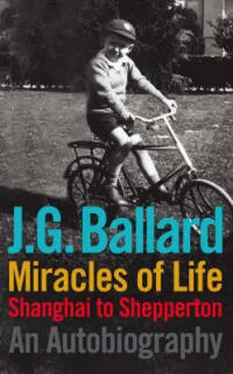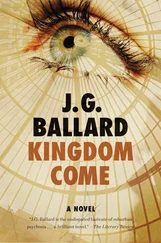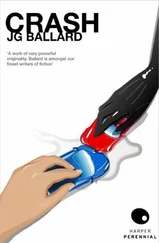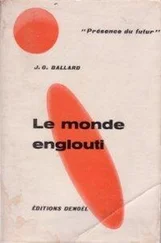Miracles of Life
Shanghai to Shepperton An Autobiography
James Graham Ballard
1
Shanghai Arrival (1930)
I was born in Shanghai General Hospital on 15 November 1930, after a difficult delivery that my mother, who was slightly built and slim-hipped, liked to describe to me in later years, as if this revealed something about the larger thoughtlessness of the world. Over dinner she would often tell me that my head was badly deformed during birth, and I feel that for her this partly explained my wayward character as a teenager and young man (doctor friends say that there is nothing remarkable about such a birth). My sister Margaret, born in September 1937, was delivered by Caesarean, but I never heard my mother reflect on its wider significance.
We lived at 31 Amherst Avenue, in the western suburbs of Shanghai, about eight hundred yards beyond the boundary of the International Settlement, but within the larger area controlled by the Shanghai police. The house is still standing and in 1991, when I last visited Shanghai, was the library of the state electronics institute. The International Settlement, with the French Concession of nearly the same size lying along its southern border, extended from the Bund, the line of banks, hotels and trading houses facing the Whangpoo river, for about five miles to the west. Almost all the city’s department stores and restaurants, cinemas, radio stations and nightclubs were in the International Settlement, but there were large outlying areas of Shanghai where its industries were located. The five million Chinese inhabitants had free access to the Settlement, and most of the people I saw on its streets were Chinese. I think there were some fifty thousand non-Chinese – British, French, Americans, Germans, Italians, Swiss and Japanese, and a large number of White Russian and Jewish refugees.
Shanghai was not a British colony, as most people imagine, and nothing like Hong Kong and Singapore, which I visited before and after the war and which seemed little more than gunboat anchorages, refuelling bases for the navy rather than vibrant commercial centres, and over-reliant on the pink gin and the loyal toast. Shanghai was one of the largest cities in the world, as it is now, 90 per cent Chinese and 100 per cent Americanised. Bizarre advertising displays – the honour guard of fifty Chinese hunchbacks outside the film premiere of The Hunchback of Notre Dame sticks in my mind – were part of the everyday reality of the city, though I sometimes wonder if everyday reality was the one element missing from the city.
With its newspapers in every language and scores of radio stations, Shanghai was a media city before its time, celebrated as the Paris of the Orient and the ‘wickedest city in the world’, though as a child I knew nothing about the thousands of bars and brothels. Unlimited venture capitalism rode in gaudy style down streets lined with beggars showing off their sores and wounds. Shanghai was important commercially and politically, and for many years was the principal base of the Chinese Communist Party. There were fierce street battles in the 1920s between the Communists and Chiang Kai-shek’s Kuomintang forces, followed in the 1930s by frequent terrorist bombings, barely audible, I suspect, against the background music of endless night-clubbing, daredevil air shows and ruthless money-making. Meanwhile, every day, the trucks of the Shanghai Municipal Council roamed the streets collecting the hundreds of bodies of destitute Chinese who had starved to death on Shanghai’s pavements, the hardest in the world. Partying, cholera and smallpox somehow coexisted with a small English boy’s excited trips in the family Buick to the Country Club swimming pool. Fierce earaches from the infected water were assuaged by unlimited Coca-Cola and ice cream, and the promise that the chauffeur would stop on the way back to Amherst Avenue to buy the latest American comics.
Looking back, and thinking of my own children’s upbringing in Shepperton, I realise that I had a lot to take in and digest. Every drive through Shanghai, sitting with the White Russian nanny Vera (supposedly to guard against a kidnap attempt by the chauffeur, though how much of her body this touchy young woman would have laid down for me I can’t imagine), I would see something strange and mysterious, but treat it as normal. I think this was the only way in which I could view the bright but bloody kaleidoscope that was Shanghai – the prosperous Chinese businessmen pausing in the Bubbling Well Road to savour a thimble of blood tapped from the neck of a vicious goose tethered to a telephone pole; young Chinese gangsters in American suits beating up a shopkeeper; beggars fighting over their pitches; beautiful White Russian bar-girls smiling at passers-by (I used to wonder what they would be like as my nanny, compared with the morose Vera, who kept a sullen grip on my overactive mind).
Nevertheless, Shanghai struck me as a magical place, a self-generating fantasy that left my own little mind far behind. There was always something odd and incongruous to see: a vast firework display celebrating a new nightclub while armoured cars of the Shanghai police drove into a screaming mob of rioting factory workers; the army of prostitutes in fur coats outside the Park Hotel, ‘waiting for friends’ as Vera told me. Open sewers fed into the stinking Whangpoo river, and the whole city reeked of dirt, disease and a miasma of cooking fat from the thousands of Chinese food vendors. In the French Concession the huge trams clanked at speed through the crowds, their bells tolling. Anything was possible, and everything could be bought and sold. In many ways, it seems like a stage set, but at the time

Myself in Shanghai in 1934 .
it was real, and I think a large part of my fiction has been an attempt to evoke it by means other than memory.
At the same time there was a strictly formal side to Shanghai life – wedding receptions at the French Club, where I was a page and first tasted cheese canapés, so disgusting that I thought I had caught a terrible new disease. There were race meetings at the Shanghai Racecourse, for which everyone dressed up, and various patriotic gatherings at the British Embassy on the Bund, ultra-formal occasions that involved hours of waiting and nearly drove me mad. My parents held elaborately formal dinner parties, where all the guests were probably drunk and which usually ended for me when some cheerful colleague of my father’s found me hiding behind a sofa, feasting on conversations I hadn’t a hope of grasping. ‘Edna, there’s a stowaway on board…’
My mother told me of one reception in the early 1930s when I was introduced to Madame Sun Yat-sen, widow of the man who overthrew the Manchus and became China’s first president. But I think my parents probably preferred her sister, Madame Chiang Kai-shek, close friend of America and American big business. My mother was then a pretty young woman in her thirties, and a popular figure at the Country Club. She was once voted the best-dressed woman in Shanghai, but I’m not sure if she took that as a compliment, or whether she really enjoyed her years in Shanghai (roughly 1930 to 1948). Years later, in her sixties, she became a veteran long-haul air traveller, and visited Singapore, Bali and Hong Kong, but not Shanghai. ‘It’s an industrial city,’ she explained, as if that closed the matter.
I suspect that my father, with his passion for H.G. Wells and his belief in modern science as mankind’s saviour, enjoyed Shanghai far more.
Читать дальше







